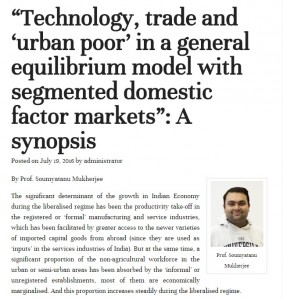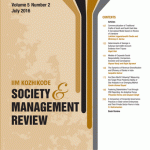FDI IN MULTI-BRAND RETAIL: FOR WHOSE BENEFIT?
By Prof. Sthanu R Nair
The Congress led UPA government allowed 51% FDI in multi-brand retail in September 2012 overruling strong opposition from various quarters including some of the UPA allies. The move invited serious criticism from several quarters with regard to its overall contribution to the growth prospects of Indian economy and its adverse impact on traditional retailers and small businesses. The government strongly defended its move by arguing that its multibrand retail FDI policy features some unique provisions which would safeguard the interests of the traditional retailers, small scale industries and the nation as a whole. The three specific safeguard measures referred vociferously by the government and the supporters of FDI in multibrand retail at that time are (see Table):
- The foreign retail firm must put 50% of the total FDI in back-end infrastructure such as investment in processing, manufacturing, distribution, design improvement, quality control, cold chain, warehouses and packaging.
- The foreign retail firm must mandatorily procure 30% of the products from “domestic” small scale industries.
- The foreign retail chains will be allowed only in cities with a population of more than 10 lakh as per the 2011 census.
Almost a year after, on August 1, 2013, the government (i.e. Cabinet Committee on Economic Affairs) approved amendments in the policy on FDI in multi-brand retailing aimed at “dilution” of the aforementioned three safeguard provisions. Importantly, these safeguards were approved by Parliament while allowing FDI in multibrand retail last year. A comparative statement of the policy before and after the amendments is provided below.
The three adverse implications of the proposed amendments are as follows:
- Possible reduction in the FDI in back-end infrastructure. This would defeat the very purpose of inviting FDI in the Indian retail sector. As is well known, the distinctive benefit India expects from FDI in retail is the improvements in the underdeveloped back-end infrastructure.
- As the economist and Nobel laureate Joseph Stiglitz has warned sometime ago the inclusion of perishables in the domestic sourcing provision would lead to a situation in which the foreign retailers would import manufacturing goods cheaply from China and meet the domestic sourcing condition simply by buying fruits, vegetables and other farm products.
- Foreign retailers can open shops even in cities with less than 10 lakh population census thereby fastening the exit of traditional retailers from business.
The changes proposed by the government without waiting to see the impact of its original policy on FDI multi-brand retailing raises some serious doubts on its commitment to protect domestic interests, to put in place a strong retail regulatory framework and most importantly to bring best out of FDI in the retail sector.Sthanu R Nair is an Associate Professor of Economics at IIM Kozhikode



















 Users Today : 177
Users Today : 177 Users Yesterday : 567
Users Yesterday : 567 This Month : 11999
This Month : 11999 This Year : 11999
This Year : 11999 Total Users : 570243
Total Users : 570243 Who's Online : 9
Who's Online : 9